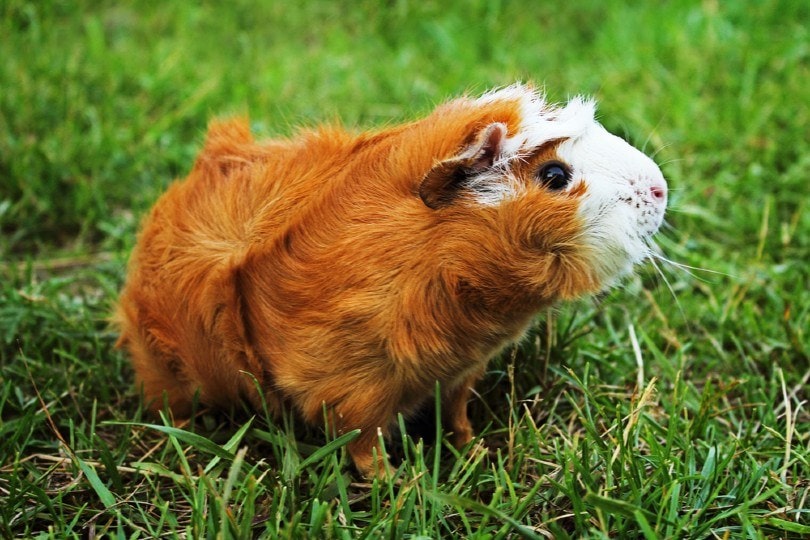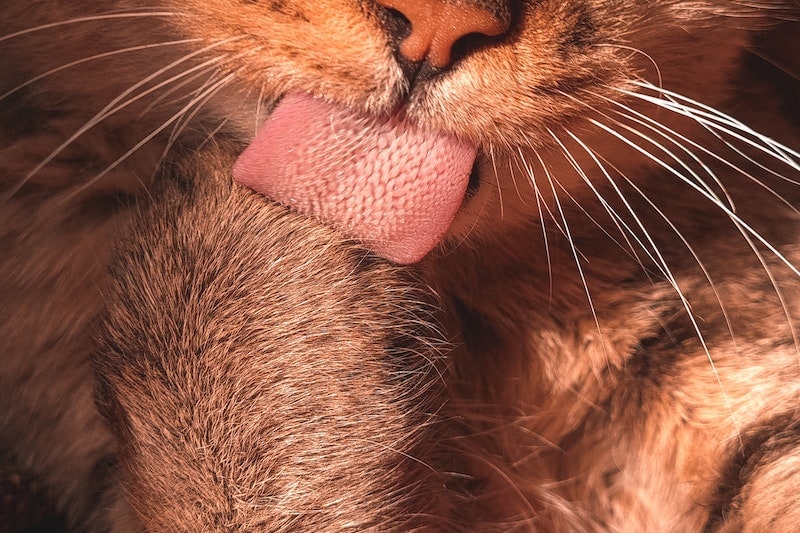VET APPROVED

The information is current and up-to-date in accordance with the latest veterinarian research.
Learn more »Click to Skip Ahead
Eye boogers and discharge are common problems that many dogs face. Although most dogs will suffer from eye boogers at some point in their lives, certain breeds are more susceptible to eye discharge than others.
If you’re wondering why dogs get eye boogers, there are several possible reasons for them, some being more benign, and others being very serious. Knowing why your dog has eye boogers can help you treat the issue and protect your dog’s health in the long run.
The 9 Reasons For Dog Eye Boogers
1. Allergies
In much the same way as we do, dogs can suffer from allergies, whether be it pollen or dust, allergies can cause your dog’s eyes to water clear discharge. If your dog’s eyes water for several days and in between sleep, the watery eyes can cause boogers and eye goop to form.
Often, watery eyes won’t be the only sign to look out for if your dog is suffering from allergies. The dog may experience red and itchy eyes, runny nose, and possibly sneezing.
If you notice that your dog’s boogers are caused by clear discharge, it’s a good idea to consider allergies as a potential cause. Visit your vet to get their eyes examined, a diagnosis, and discuss treatment options. If your vet suspects allergies, they may prescribe some corticosteroid or antihistamine eye drops. If your dog’s skin is also itchy or inflamed, your vet may also recommend a shampoo, a lotion, injections, or oral medication.
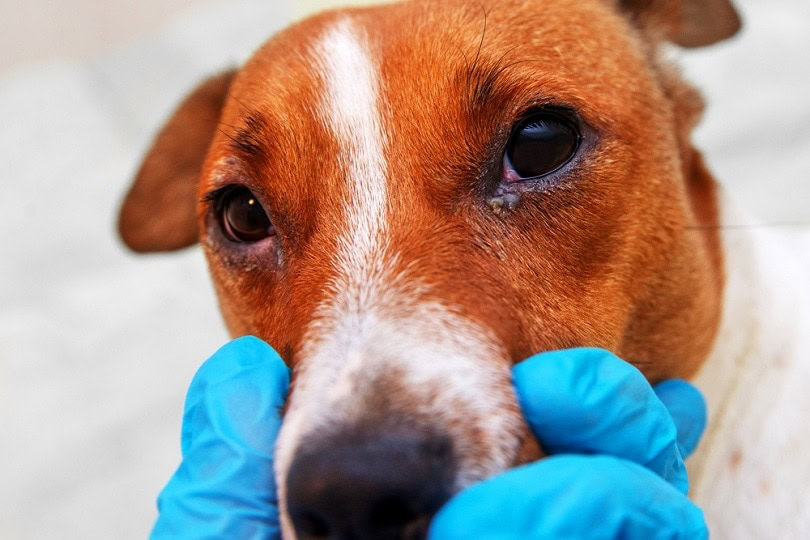
2. Wind
If you have ever stood outside for a long time in the cold or wind, you know that freezing temperatures and wind can cause eyes to water and develop boogers. The same is true for your dog. If your dog has been outside for a long time, especially when it is windy and cold, boogers may develop.
Boogers caused by the wind can be treated easily. Do not leave your dog outside for too long if it is particularly cold and windy. When you bring your dog back in, wipe down their eyes so that the clear discharge doesn’t turn into boogers.
3. Eyelash or Foreign Bodies
Eyelashes and foreign material can get into your dog’s eyes. Unlike us, dogs have trouble getting items out of their eyes because of their claws. Whenever an irritant gets into your dog’s eye, the affected eye will start tearing up, but the other eye will remain normal.
If the tears are not able to remove the debris from the eye, your dog’s eye will continually tear up until the item is removed. In the meantime, boogers and other goo can build up as a result.
If the irritant goes away, the eye boogers will disappear. Once the eye stops watering, wipe down the dog’s face with a gentle cloth to remove any excess and prevent boogers from building up. If the dog is still showing signs that something is in their eye, you can try to gently flush your dog’s eye or, if no improvement is noticed, take them to the vet as soon as possible.
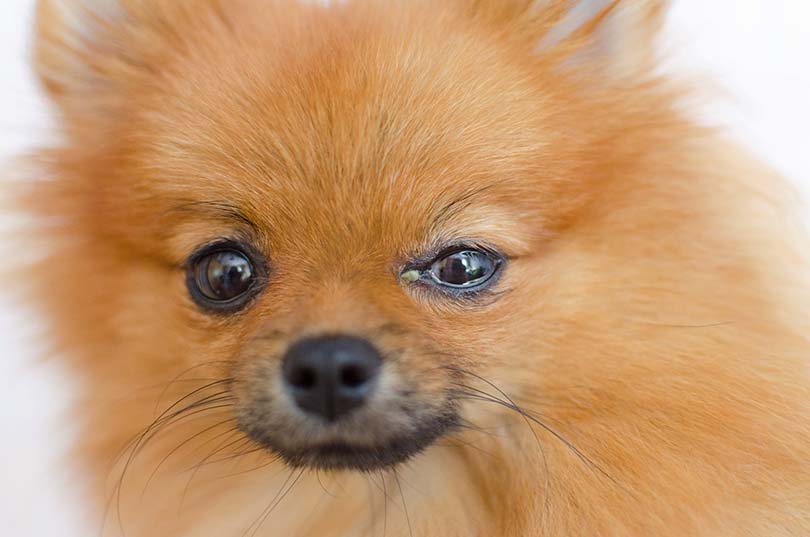
4. Dry Eyes
Although it may sound odd, keratoconjunctivitis sicca or dry eye can cause eye boogers. If your dog cannot produce enough of the watery part of the tear film, a thick eye discharge may come as a result. Your dog may be suffering from dry eyes mainly because of an immune-mediated destruction of the tear gland, hormonal problems, or neurological issues.
If you think your dog has dry eyes it’s essential to get your dog to the vet promptly. Untreated dry eye can cause serious consequences such as eye infections, corneal ulcers, and corneal pigmentation.
Your vet will diagnose the problem and create a treatment plan. They will probably prescribe immunosuppressive drugs, antibiotic drops, artificial tears, or in extreme cases, even surgery.
5. Conjunctivitis
Conjunctivitis is an inflammation on the conjunctiva, the lining of your dog’s eye. Conjunctivitis can be caused by many different problems, including allergies, dry eye, bacterial, or viral infections. Conjunctivitis often causes eye discharge, which can be clear and watery, mucusy or have a yellow-green color.
Some other signs of conjunctivitis include frequent blinking, red eyes, squinting, crusty eyes, and pawing at the eyes.
Take your dog to the vet if you suspect conjunctivitis. Your vet will be able to diagnose the cause for the conjunctivitis. Knowing what is causing the issue is how you fix it. If severe allergies are causing the conjunctivitis, your vet may prescribe antihistamines or corticosteroids, it’s important to note that conjunctivitis can be a manifestation of a general health problem, such as distemper infection or lymphoma.
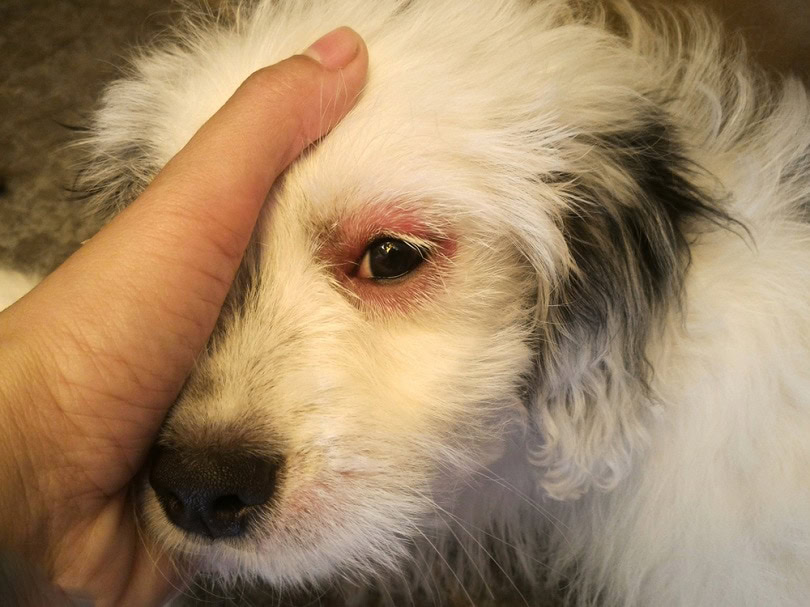
6. Corneal Ulcers
A corneal ulcer happens whenever trauma has occurred to the cornea. Injury is the most common cause for ulcers, along with dry eye, foreign bodies, or certain infections. Corneal ulcers are very painful, and dogs will experience sensitivity to light, squinting, excessively pawing at their eyes, and eye discharge.
Urgent medical treatment is required if corneal ulcers are to blame for your dog’s eye boogers. You will need to take your dog to the vet so that your vet can come up with an effective treatment strategy. Often, the treatment includes a protective collar, antibiotics, pain relief medication, and sometimes surgery.
7. Epiphora
Epiphora is a fancy word for the overflow of tears from the eye. Often, excessive tearing causes intense boogers, stained fur, smelly fur, and infected skin. Epiphora can be caused by eye irritation or abnormal tear drainage and certain breeds are more susceptible to epiphora than others. Abnormal tear drainage can be a consequence of abnormal anatomy or the presence of a foreign body in the nasolacrimal duct. In these cases the problem will be clearly unilateral and the discharge will be very persistent.
Because epiphora can have such serious causes, take your dog to the vet to rule out cancer and foreign bodies ulcers as the cause. Your vet will perform diagnostic tests and in some cases the dog may need to have surgery.
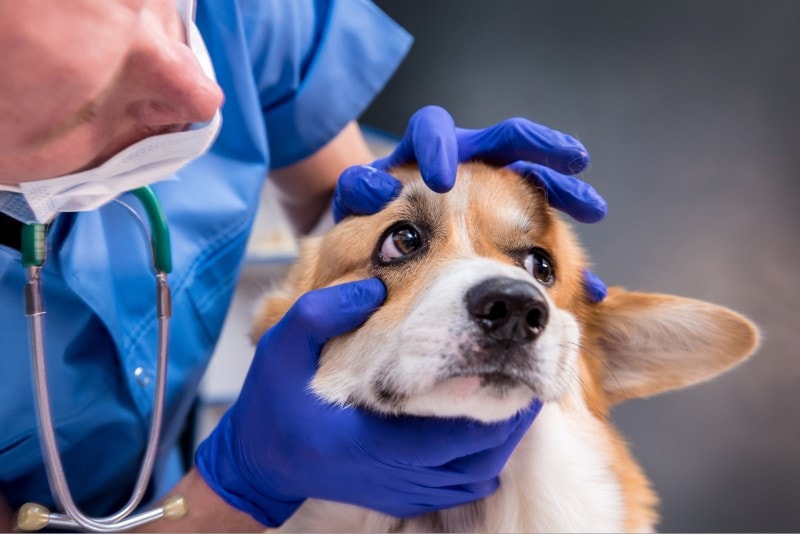
8. Glaucoma
Glaucoma is a serious condition that can lead to blindness. It is caused whenever there is excessive pressure inside the eye which is measured with a tonometer. Signs of acute glaucoma include bulging eyes, cloudy eyes, tearing, and sometimes bumping into things.
Glaucoma is a highly serious condition for both dogs and humans alike. Take your dog to the vet immediately if you suspect glaucoma is an issue. Your vet will likely prescribe different types of medication for pressure management, on occasions surgery might be recommended.
9. Breed
Some dogs are simply more prone to eye conditions than others. Brachycephalic or flat-faced dogs, such as pugs, bulldogs, and shih tzus for instance, suffer from what is called brachycephalic ocular syndrome and often get a lot of eye discharge because they have shallow eye sockets, eyelid malposition, and prominent nasal folds. Similarly, these dogs can suffer from tear drainage abnormalities and sometimes suffer from other eye problems such as cherry eye.
All these conditions lead to watering eyes and eventually boogers.
If your dog’s breed is to blame for their boogers, it’s important to be diligent in providing your dog with good hygiene and follow your vet’s guidance with regards to medical and surgical treatment. Clean and check your dog’s eyes every night and seek help if you notice anything abnormal. That way, the discharge doesn’t build up or lead to more serious issues down the line.

How to Prevent Dog Eye Boogers
Eye boogers not related to medical conditions can often be prevented with good hygiene and grooming. Some dogs will need a bit more help to take care of their eyes. If you notice that your dog’s eyes have mild one-off watery discharge, gently wipe them down using a moist cloth.
Additionally, make sure that the fur around your dog’s face is groomed away from their eyes. Dogs with wrinkles and drooping skin often get irritations that fall into their eyes. Keeping their faces clean and properly groomed can avoid a lot of pain down the road.
When to Call Your Vet
Although some eye boogers in dogs are nothing to worry about, you should always contact a vet if the eye boogers are persistent, have a yellow, whitish, or green color, or if they are accompanied by other problems such as red eyes, squinting, or pawing at the eyes or face. Likewise, go to your vet if the eye boogers come back after wiping them away.
Final Thoughts
If you notice a one-off booger in your dog’s eye, it is likely just from wind, dust, or regular ocular discharge. If the boogers are very small, clear, and not accompanied by other signs of ocular issues, just wipe off the booger and observe your dog in case it forms again. However, call your vet if the dog eye boogers are accompanied by other eye signs, or if they are persistent.
See also:
Featured Image Credit: nadisja, Shutterstock








